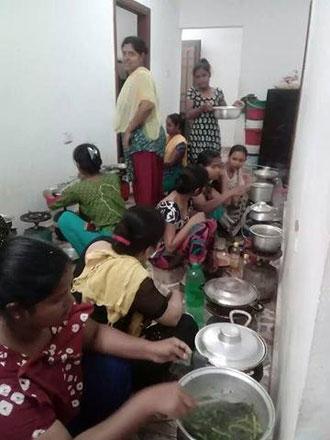You are here
Guest worker advocacy groups accuse Irbid garment factory of labour violations
By Laila Azzeh - Feb 12,2017 - Last updated at Feb 12,2017

Photo released by Tamkeen Fields for Aid on Sunday show guest workers living in difficult conditions at the facilities of a garment factory in Irbid (Photo courtesy of Tamkeen Fields for Aid)
AMMAN — Guest worker advocacy groups on Sunday accused a garment factory in Irbid of violations against dozens of workers, claiming that the alleged infringements could involve human trafficking offences.
Located in Al Hassan Industrial Estate in Irbid, some 80km north of Amman, the plant in question has already been investigated, while the owner was referred to court last year after the alleged illegal practices were brought to the attention of the Public Security Department’s Anti-Human Trafficking Unit.
“The case was referred to Ramtha’s prosecutor general last year on human trafficking counts, but no precautionary measure was taken by the authorities to protect the victims during the court procedures,” Director of Tamkeen Fields for Aid Linda Kalash told The Jordan Times.
She noted that the violations are still ongoing against more than 100 Bangladeshi and Indian workers.
“They are still facing the same injustices,” said Kalash, noting that the violations include forced labour, physical and verbal abuse and inappropriate accommodation — every eight workers live in a room that lacks proper ventilation and is full of insects.
Labourers are also prohibited from taking sick leaves, receive their salaries 10 days later than what is agreed on and “half of their pay is deducted in the case of mistakes, even minor ones”.
Ahmad Awad, director of the Phenix Centre for Economic and Informatics Studies, described the situation of the workers as “horrible” and “sickening”, claiming that the Labour Ministry has not taken any measure against the factory management even after its inspectors documented the infringements.
“Labourers who speak against the injustices are threatened to be laid off or accused of theft,” he told The Jordan Times, adding that the long working hours in addition to unsuitable accommodation and lack of heating are affecting workers’ health.
These reported violations led the labourers to hold a work-stoppage on February 9, but they were asked to go back to work amid promises from the plant management to respond to their demands, according to Tamkeen and Phenix statements.
After going back to work, the labourers were surprised to know that nine of their colleagues were laid off.
“The management also reports misleading information to the Labour Ministry about the labourers in order to pressure them to continue their work,” Kalash charged.
Labour Ministry Spokesperson Mohammad Khatib said the workers held a work stoppage between January 24 and February 2, during which more than 13 inspection campaigns were carried out on the factory.
“The inspections were meant to — in addition to issuing tickets against it and a number of workers — address violations committed by the company regarding its work environment and its failure to pay salaries and renew employees’ work permits,” he said.
Khatib underlined that the inspections and consultations are ongoing between the inspectors, workers and the management.
“The labourers want to work overtime and company is refusing because there is no need for extra working hours,” he said, adding that the ministry will soon take a series of measures regarding the plant in question.
The worker rights’ advocates called for more protection for the labourers, holding the violators accountable and opening an independent investigation into the case.
The Kingdom has ratified several international agreements related to human trafficking, such as the Protocol to Prevent, Suppress and Punish Trafficking in Persons, Especially in Women and Children, which is part of the UN Convention against Transnational Organised Crime.
In addition, Jordan has adopted a national strategy to combat human trafficking, which focuses on prevention, protection, law enforcement and international cooperation to eradicate the phenomenon.
Related Articles
AMMAN — Authorities are investigating reported human trafficking offences committed against dozens of labourers in a garment factory in Irbi
AMMAN — Labour Minister Ali Ghezawi on Thursday ordered the closure of a garment factory in Irbid for violations against its workers.Accordi
AMMAN — A legal aid organisation has condemned the “undignified” work conditions some labourers experience in the Qualified Industrial Zones















